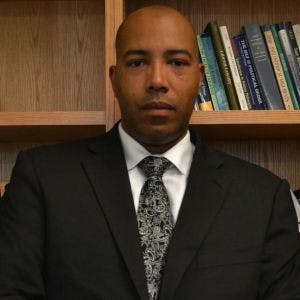Race is not real, Christopher Lebron said. It’s a way for people to consider themselves better than others.
The Johns Hopkins University philosophy professor challenged modern conceptions of race Thursday night in his speech, “‘A Coming Out Of Ourselves’: Knowing Our Place In Racial Injustice” at Smathers Library.
Lebron’s speech was the second installment in the “Race and the Promise of Participation” 2019-2020 Rethinking the Public Sphere Part I speaker series hosted by the UF Center for the Humanities and the Public Sphere.
He encouraged the room of about 30 students and faculty to reconsider their understanding of race.

Christopher Lebron.
“Race is not a biological idea,” he said. “It's not a scientific idea. It's one that's a social construction.”
Lebron said a lack of “moral imagination” blocks social justice because white people can’t understand how it feels to be black, and it limits their capacity for sympathy.
“Just lacking the curiosity in the first place is usually the first place anyone ever goes wrong,” he said. “This to me is what white privilege is about, right? The presumption that one is already on one's way when they are, in fact, not on their way.”
Lebron integrated concepts, poems and work from well-known black writers, including James Baldwin and Toni Morrison, that describe the black experience.
Tiffany Pennamon, a 25-year-old UF English doctoral student, attended his speech. She said as a black English student, she appreciated his inclusion of important black literature.
“I think a lot of people discount the value of the humanities and just writing in terms of how it can implement social change,” she said. “And so just to hear him really emphasize just the inherent value of this work to really try to... reimagine what it means to be a marginalized person in this world.”
Barbara Mennel, Rothman chair and director for the UF Center for the Humanities and the Public Sphere, said the department invited Lebron because of his focus on race. She hopes people will better understand the public sphere, which Oxford Bibliographies defines as the social space where ideas and thoughts are communicated, as a result of it.
“I hope that they think about, really, what is the public sphere and how do we engage in the public sphere and how can the humanities offer ways to think about it?” she said.
Leigh Ann Wheeler, a professor of history at Birmingham University, will conclude this section of the speaker series Feb. 13 with “‘Anne Moody and Voting Rights in the Era of Black Power’: After Coming of Age in Mississippi”.





![Photo of the missing Leachianus “Leachie” gecko. [Photo courtesy of Mike Southwick]](https://snworksceo.imgix.net/ufa/907bd92a-0b29-40eb-a5fb-d7db7cf98b2f.sized-1000x1000.jpg?w=1500&ar=16%3A9&fit=crop&crop=faces&facepad=3&auto=format)
